The History and Development of Online Gaming
By Alex@PC╺
- PS4
- PS5
- XBox One
- Series X
- PC
The First Steps
Online gaming began in the 1990s. At first, it looked like freedom. People connected across dial-up lines, sharing play beyond borders. Many thought this was the start of something open and creative.
But capital entered quickly. The dream of shared culture soon became a market. Ownership shifted from communities to corporations, and gaming was reshaped as a product.

From Play to Business
Early games were often free, shared in forums, and built by passion. Players exchanged ideas, and developers worked together for fun.
This did not last. Large companies saw profit in the new digital world. Subscriptions, licensing, and in-game purchases replaced free sharing.
By the 2000s, gaming was less about community and more about consumption. It became another way for capital to grow.
Platforms Take Control
The 2010s changed everything. Platforms like Steam, app stores, and console networks dominated. Games no longer belonged to players.
Instead, they were licenses controlled by corporations. Updates could be forced. Titles could be removed. Data collection became a profit tool. Consolidation meant fewer choices and less freedom. Control passed entirely into the hands of global companies.
Gambling Joins the Story
As games spread online, gambling entered the same spaces. The language was dressed up: fun, freedom, opportunity. In reality, it was exploitation.
Today, platforms invite players to bet on granawin.com or similar sites. For working-class people under pressure, this is no simple “choice.” It is often an escape shaped by debt, unemployment, and austerity. Companies profit from despair while presenting risk as entertainment.
Gamification Everywhere
The gambling model did not stay in casinos. It spread into everyday gaming. Loot boxes, random prizes, and reward wheels made children and adults spend money for uncertain gains. This normalized risk. It blurred the line between gaming and gambling.
Governments failed to act, tied to the same corporations that fuel these industries. Entertainment was reshaped by finance, not creativity.

The Illusion of Inclusion
Corporations market themselves as inclusive. Ads show diversity and slogans about belonging. But this is not liberation.
It is market expansion. Representation becomes a product, used to draw new consumers. Workers and players still face exploitation. Inclusion without real power only strengthens corporate control.
Labor Behind the Screen
The story of online gaming hides its labor. Developers, designers, and service staff work long hours. Outsourced teams, often in the Global South, face abuse for low pay. Moderation, server management, and customer support are treated as disposable. Behind the glamour of digital play lies a system of exploitation.
A Different Vision
Online gaming could be different. Cooperative platforms and open-source projects already exist. Communities run servers and share games without corporate control.
These examples show that play does not have to serve profit. A radical future would mean public investment in digital culture, worker ownership, and collective rights. Gaming could belong to everyone again.
Why It Matters?
The history of online gaming mirrors society itself. What began as sharing has become monopoly. What promised connection has become surveillance.
But struggle is possible. People can reclaim culture as they have reclaimed housing, education, or public space. Gaming can be more than profit—it can be joy, creativity, and freedom built by the many.
